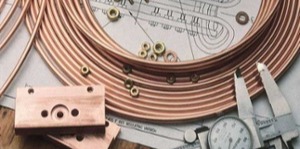Curing Material on an Aluminum Mandrel
Objective Heat a customer supplied aluminum cylinder to 80-120°C for a material curing application. More application notes
Processes
Processes: More
Processes: More

Industries:
Industries: More
Industries: More
Industries: More

Products:
Products: More
Services:
Services: More

Learn:
Learn: More
About:

2 min read
Brett Daly
10/28/15 2:07 PM

Any company can sell you a power supply, ship it to you, and wish you the best. A company that provides applications testing, uses their induction and applications expertise to prove out your process, and recommends the right system for your process requirements can make all the difference. If you need a part heated in 10 seconds, you might need one power supply, but if 20 seconds is sufficient a lower power solution might be all you need. Tailored applications expertise from an experienced team in a proper lab can save you money and headaches.Coil Design
Designing and creating the right coil for your heating application is also critical. Be sure your vendor can recommend, design and supply a tailored coil that will maximize the efficiency of your process so you can take full advantage of the benefits of induction heating.
Does the vendor actually make the equipment, or do they merely resell it? Logically, if the facility that designs and manufactures the equipment is supporting you in process design, service and support after the sale, you’ll enjoy a better experience that leads to superior results and uptime. Is the vendor's facility ISO certified? Does the equipment have CE marking? If you are an OEM, do they have experience manufacturing for OEMs?
Cheaper isn't always better. Some imported units have a low power rating which leads to inferior efficiency – in effect less power is getting to your part, significantly less in some cases. You might find one company’s lower power system can do the same thing another company’s higher power system does, so the price advantage evaporates. Also, be sure to check on the warranty.
Being able to easily change capacitors, tap transformers and coils will allow you to use your system for multiple applications if you so desire. Some systems even automatically update their taps based on the load.
Is your vendor focused on induction? For example, if you want temperature logging and monitoring, does your vendor have a solution? If you have a large part, can they offer a flexible coil that will work for you? If you’re focused on a unique application like nanoparticle heating, can a tailored solution be offered? Do they have temperature control and monitoring options?
Is the supplier you’re considering set up to support you? Do they stand behind their product and offer a two-year warranty? Can they come, set you up, and do training? Do they offer global support? Consider whether they actually make the equipment (and therefore really know the equipment), and if they have a team that can get to you efficiently.
Again, do they actually manufacture the equipment? Have they been around a while? Are their clients saying good things? Learning about the vendor’s reputation will give you invaluable peace of mind.
What vendor/solution will ultimately lead to the best experience and the lowest cost of ownership? Some companies have had to replace all of their systems from their initial vendor because they under-delivered on power and support was minimal at best.
If you consider all of these factors, and select a supplier based on them, you’re sure to have a great experience where you get the right power supply for your specific application. And read more about Ambrell's best-in-class Applications Laboratories, commonly known as THE LAB at Ambrell.

Objective Heat a customer supplied aluminum cylinder to 80-120°C for a material curing application. More application notes

In today’s manufacturing landscape, efficiency, precision, and sustainability are critical. Induction heating—a process that uses electromagnetic...

When it comes to many manufacturing processes, including this forging application, precision and efficiency are critical. Traditional heating methods...